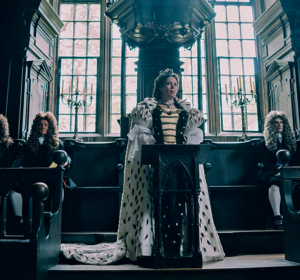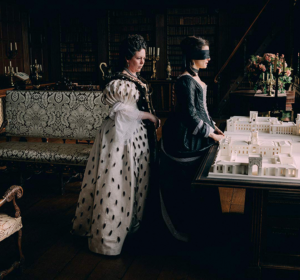If you are looking for the stale pomp and majesty that films like “Elizabeth” and “The Young Victoria” bring to the historic British monarchy, you will leave “The Favourite” severely disappointed. Instead, director Yorgos Lanthimos delivers a historical romp that blows up the patriarchy and monarchical grandeur in equal parts, making for a chaotic, hysterical and joyful viewing experience.
The film follows the political and sexual power struggle between Sarah Churchill, played by a wonderfully savage Rachel Weisz, and Abigail Masham, played by a charmingly coy Emma Stone, as they seek the favor of Olivia Colman’s Queen Anne. The queen is the opposite of regal: crude, sickly and unaware of the actual politics at play around her. She does understand, however, the social politics of being her designated favorite lady in waiting, pitting Sarah and Abigail against each other with wicked delight at the struggle.
Colman, Weisz and Stone are all brilliant in the film. Watching three fully formed, dynamic women spar verbally and physically feels almost revolutionary in a male-dominated industry.

Even more subversive is the fact that every male character in the film reads as noticeably less serious than each of the female leads. The male politicians, particularly Nicholas Hoult’s Robert Harley, are dressed in a ridiculous and extravagant manner with wigs that would put Marie Antoinette’s to shame.
Monarchical period dramas typically rely on a male love interest. The real relationships of substance — and pleasurable sex — in “The Favourite” are instead between the three women; the men are only there for the women to use for political gain. In reality, Anne was married during the time the film took place, but the film does not address her husband at all.
Beyond the film’s gender play, Lanthimos’ direction is unorthodox as well, which is to be expected based on his previous work, including the avant-garde dramas “The Lobster” and “The Killing of a Sacred Deer.” He uses wide angle shots generously, disorienting the viewer in massive royal spaces. He prompts his actors to use their physicality in a way rarely seen in a period piece. They leap, shove, roar and dance absurdly. They race ducks and throw oranges at naked men. The
freedom of movement feels wild for a historical film, and viewers will find the manic energy joyous to watch.
Oddly enough, Lanthimos’ playful interpretation of history humanizes his characters in a way other period pieces often fail to do. No one, not even a great figure of history, is truly glorious. Everyone is flawed, everyone curses, everyone wants sex and power, and everyone is weak.
The film takes many departures from history, but the core emotions still hit. Queen Anne did not actually have 17 rabbits — one for each of her children who died — but she was still a grieving woman who failed at a queen’s main duty: to produce an heir.

While humanizing at times, the absurdist nature of the film can be distracting. A long dance sequence between Sarah and Samuel Masham, played by a surprisingly comical Joe Alwyn, tries too hard to be funny and ends up feeling unnecessary.The final shots of the film land oddly, leaving the viewer searching to find a meaning. This viewer was unable to find one.
Yet, these critiques are small; the film is wickedly wonderful. Colman, Weisz and Stone have abundant chemistry, making the film a joy to watch as they manipulate and deceive each other. Most intriguingly, these actions are typically reserved for women in films wanting a man. These women, however, want power for themselves above all else. The stale royal biopic is dead in “The Favourite,” replaced instead with feminist farce.














Lewis Johnson • Apr 23, 2019 at 11:33 am
Great post.